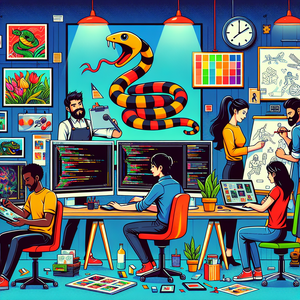
Unveiling the World of Recipe Development: A Journey Through Culinary Careers
In recent years, the culinary world has evolved dramatically, opening exciting avenues in the realm of recipe development. For many, this engaging field is more than just a career; it’s a blend of passion, creativity, and a love for food. Whether you’re a home cook eager to make a mark or a seasoned chef exploring freelance possibilities, the opportunities are plentiful and diverse. The journey of Ali Slagle, a freelance recipe developer, exemplifies how a combination of culinary passion and practical experience can lead to a fulfilling career. With paths ranging from formal education to self-directed learning, aspiring recipe developers have numerous ways to turn their culinary dreams into reality. This article takes you through various roles in recipe development, detailing job responsibilities, necessary skills, and potential career paths in this dynamic industry.
Job Summaries:
Recipe Developer:
- Recipe Developers are the creative minds behind original recipes for cookbooks, websites, and food magazines.
- Their work involves extensive research, ingredient sourcing, and meticulous testing to ensure recipes are both innovative and accessible.
- While a culinary degree or substantial cooking experience is beneficial, strong writing skills are equally important for documenting recipes.
- By introducing new flavors and techniques, Recipe Developers enrich the cooking experience for everyone.
Recipe Tester:
- Recipe Testers play a crucial role by meticulously following recipes to validate their accuracy.
- With a keen eye for detail and strong culinary skills, they provide invaluable feedback that helps refine recipes.
- Although formal culinary training isn’t always required, the insights they offer are indispensable to the recipe development process.
Food Stylist:
- Food Stylists focus on making food visually appealing for photography and media.
- They collaborate with chefs and recipe developers to enhance the presentation of dishes.
- A successful Food Stylist combines a strong aesthetic sense with culinary knowledge, playing a vital role in marketing and social media engagement.
Culinary Writer:
- Culinary Writers create enjoyable and informative content about food, cooking, and recipes across various platforms.
- They draw upon their culinary expertise to connect professional chefs with home cooks.
- They enrich the culinary culture and make gourmet cooking more accessible.
Food Photographer:
- Capturing the essence of dishes through stunning images
- Food Photographers highlight culinary creations for cookbooks and digital media
- A solid grasp of composition, lighting, and food styling is essential for success in this visually-driven role
- This role significantly impacts public perception of food.
Culinary Instructor:
- Culinary Instructors teach cooking techniques and recipe development in educational settings.
- They blend practical experience with theoretical knowledge to inspire future culinary professionals.
- Effective communication skills are key to conveying complex concepts to students.
Research Chef:
- Research Chefs merge culinary arts with food science to innovate new food products.
- They conduct experiments that align with consumer trends and dietary needs.
- Typically requiring a culinary degree or food science background, they play a crucial role in product development.
Menu Developer:
- Creating enticing menus for restaurants and events
- Focus on culinary trends and customer preferences
- Demands creativity, culinary skills, and business insight
- Design offerings that enhance dining experiences
- Drive profitability
Cookbook Author:
- Cookbook Authors share their culinary expertise and unique recipes through published works.
- A deep understanding of cooking techniques and food trends, paired with strong writing abilities, enables them to inspire and educate readers, making cooking enjoyable and accessible.
Nutritional Consultant:
- Nutritional Consultants craft recipes and meal plans that cater to specific health goals.
- Their expertise in nutrition and culinary arts allows them to create balanced and flavorful dishes.
- This reflects the growing emphasis on health-conscious dining.
Culinary Product Developer:
- Focusing on flavor profiles and market trends, Culinary Product Developers design new food products.
- They conduct taste tests and collaborate with marketing teams to ensure product success.
- Playing a vital role in culinary innovation.
Gastronomy Consultant:
- Gastronomy Consultants offer insights into food trends and techniques.
- They help businesses adapt to consumer preferences.
- Their unique blend of culinary knowledge and market analysis enhances culinary offerings across the industry.
Catering Manager:
- Overseeing event planning and execution
- Catering Managers design menus
- Manage logistics for memorable dining experiences
- Strong organizational skills are essential
- Culinary expertise is essential
- This is a multifaceted role
Food Safety Specialist:
- Food Safety Specialists ensure compliance with health regulations in food production.
- By developing safety protocols and conducting inspections, they play a critical role in maintaining public health standards.
Beverage Developer:
- Beverage Developers craft innovative drink recipes
- Requires a solid foundation in culinary arts or mixology
- Creativity in introducing new flavors enhances the beverage industry and its offerings.
Food Blogger:
- Food Bloggers share their culinary experiences and recipes online.
- Engaging audiences through blogs and social media.
- Strong writing skills are essential for success in this role.
- Digital marketing knowledge is essential for success in this role.
- Allows them to build a loyal following.
Culinary Events Coordinator:
- Culinary Events Coordinators organize food-related events.
- They manage logistics and create engaging experiences for attendees.
- Their role promotes culinary culture and education.
- This role necessitates excellent organizational and culinary skills.
Flavorist:
- Flavorists specialize in developing appealing flavor profiles for food products.
- They draw on knowledge from chemistry and culinary arts.
- Their expertise is essential for creating tastes that resonate with consumers.
Farm-to-Table Consultant:
- Farm-to-Table Consultants assist businesses in sourcing local ingredients.
- They promote sustainability and seasonal menus.
- Their expertise in agriculture and culinary arts strengthens the connection between chefs and local farmers.
Culinary Arts Program Director:
- Culinary Arts Program Directors oversee educational programs
- Ensuring curricula meet industry standards
- Effectively preparing students for successful culinary careers.
The culinary industry is rich with diverse opportunities for those passionate about food, each role offering a unique blend of skills and potential. From innovating recipes to ensuring food safety, the spectrum of careers in recipe development and food innovation is broad and vital in today’s culinary environment. Aspiring professionals can find fulfilling careers by harnessing their culinary passions, educational backgrounds, and creativity. With the culinary field experiencing ongoing growth, there has never been a better time to explore these exciting career paths. Each step taken in this journey not only enhances personal growth but also contributes to the vibrant tapestry of culinary culture.
Explore More Jobs
